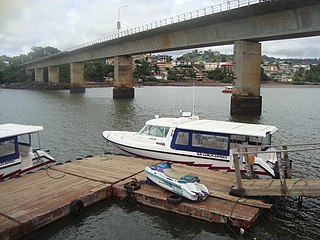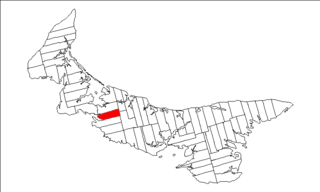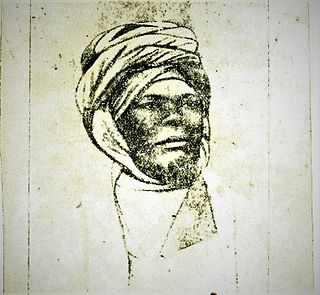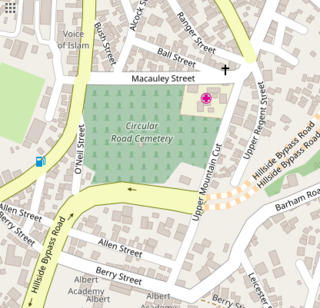
Freetown is the capital and largest city of Sierra Leone. It is a major port city on the Atlantic Ocean and is located in the Western Area of the country. Freetown is Sierra Leone's major urban, economic, financial, cultural, educational and political centre, as it is the seat of the Government of Sierra Leone. The population of Freetown was 1,055,964 at the 2015 census.

Lakeville is a town in Plymouth County, Massachusetts, United States. The population was 11,523 at the 2020 census.

The Mount Hope Bay raids were a series of military raids conducted by British troops during the American Revolutionary War against communities on the shores of Mount Hope Bay on May 25 and 31, 1778. The towns of Bristol and Warren, Rhode Island were significantly damaged, and Freetown, Massachusetts was also attacked, although its militia resisted British attacks more successfully. The British destroyed military defenses in the area, including supplies that had been cached by the Continental Army in anticipation of an assault on British-occupied Newport, Rhode Island. Homes as well as municipal and religious buildings were also destroyed in the raids.

Lot 25 is a township in Prince County, Prince Edward Island, Canada. It is part of St. David's Parish. Lot 25 was awarded to Archibald Kennedy and James Campbell in the 1767 land lottery. One half was sold for arrears in quitrent in 1781.
Thomas Peters, born Thomas Potters, was a veteran of the Black Pioneers, fighting for the British in the American Revolutionary War. A Black Loyalist, he was resettled in Nova Scotia, where he became a politician and one of the "Founding Fathers" of the nation of Sierra Leone in West Africa. Peters was among a group of influential Black Canadians who pressed the Crown to fulfill its commitment for land grants in Nova Scotia. Later they recruited African-American settlers in Nova Scotia for the colonisation of Sierra Leone in the late eighteenth century.
There have been a number of mayors of Freetown, Sierra Leone. Until the municipality of Freetown was established in 1895, the post of mayor was effectively in the gift of the colonial Governor, so some mayors have been appointees rather than elected representatives of Freetown, Sierra Leone.

Sir Samuel Lewis was a Sierra Leonean Krio mayor of Freetown and lawyer. Lewis was the first West African ever knighted and was the third Sierra Leonean to qualify as a barrister. Lewis was the first mayor of Freetown after the Freetown Municipal Council was established. In 1896, he was made a knight, the first West African to achieve such an honour, a year after he had been appointed mayor.
Sierra Leone National Premier League is a professional football league in Sierra Leone. It was founded in 1967. The league is sponsored by the Sierra Leone Commercial Bank, one of the major Sierra Leonean banks. East End Lions and Mighty Blackpool are the two biggest and most successful clubs. The National Premier League is controlled by the Sierra Leone Football Association. The season runs from March to July.

The Commander-in-Chief South Atlantic was an operational commander of the Royal Navy from 1939. The South American area was added to his responsibilities in 1960, and the post disestablished in 1967.

The Bridgewater-class sloop was a class composed of two sloops built for the Royal Navy, HMS Bridgewater and HMS Sandwich. The ships were part of the Royal Navy's 1927 Build Programme as replacements for the Flower-class sloop.
Samuel Cleland Campbell was an Australian rules footballer who played with Collingwood in the Victorian Football League (VFL).

HMS Witch (D89) was a Modified W-class destroyer of the British Royal Navy that saw service in World War II.
Freetown City Council is the municipal government of the city of Freetown, the capital of Sierra Leone. It was established in 1893 and is one of the oldest municipal governments in Africa. The Freetown City Hall, located on Wallace-Johnson Street, is the meeting place and seat of government of the Freetown City Council.

The Sierra Leone Creole people are an ethnic group of Sierra Leone. The Sierra Leone Creole people are descendants of freed African-American, Afro-Caribbean, and Liberated African slaves who settled in the Western Area of Sierra Leone between 1787 and about 1885. The colony was established by the British, supported by abolitionists, under the Sierra Leone Company as a place for freedmen. The settlers called their new settlement Freetown. Today, the Sierra Leone Creoles are 1.2 percent of the population of Sierra Leone.

The Oku people or the Aku Marabout or Aku Mohammedans are an ethnic group in Sierra Leone and the Gambia, primarily the descendants of marabout, liberated Yoruba people who were released from slave ships and resettled in Sierra Leone as Liberated Africans or came as settlers in the mid-19th century.
Sarah E. Gorham (1832–1894) was the first woman to be sent out as a missionary from the African Methodist Episcopal Church. Her life is not documented until 1880, when she visited family members who had moved to Liberia, presumably via the American Colonization Society. While there, she became interested in the people of the area and the programs of the missionaries. She has been described as a "missionary, church leaders, social worker". After this visit, she returned to the United States and was involved at the Charles Street African Methodist Episcopal Church. In 1888, at the age of 56, she went to the Magbelle mission in Sierra Leone, as the AME's first woman foreign missionary. At Magbele she established the Sarah Gorham Mission School, which gave both religious and industrial training. In July 1894 she was bedridden with malaria and died the next month. She was buried in the Kissy Road Cemetery in Freetown, Sierra Leone.

Circular Road Cemetery is a cemetery located in Freetown, Sierra Leone. It was opened in 1827. Urban expansion had meant that the old burial ground at the south end of Howe Street had become surrounded by houses and so could not be enlarged. While the old cemetery was still used for the descendants of Nova Scotia and Maroon settlers, this was subsequently turned into a playground.

Sierra Leone remained a British colony throughout World War II. As such, it fought alongside the Allies against the Axis. No large scale battles or military action took place in or around Sierra Leone during the war. However, the colony played a critical role in supporting the Allies throughout the conflict, with Freetown acting as an important convoy station.
William Campbell was a Creole businessman who worked at Connaught Hospital during the early 1900s.
John William Campbell was deputy mayor of Freetown, Sierra Leone. He was a Creole of Egba and Ife descent. His family was prominent amongst the Creoles in the early 1900s. His mother, Sarah Campbell, was an Egba while his father, John Campbell, was an Ife. His brother William Campbell was a businessman at Connaught Hospital in Freetown, Sierra Leone. An elder brother also called John William Campbell, was Justice of Peace of the Colony of Sierra Leone.











